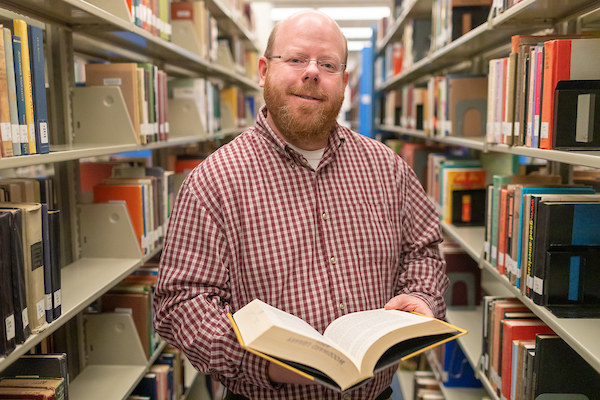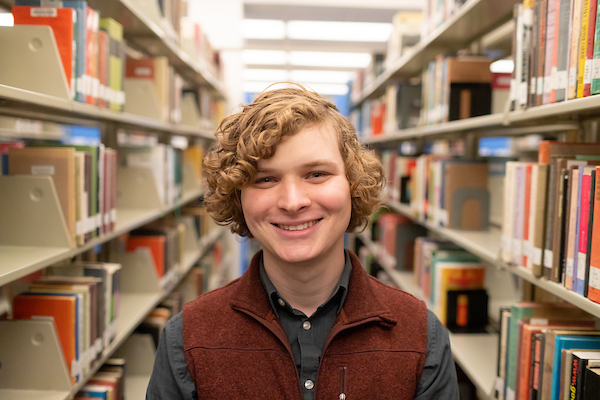APSU psychological science professor and student to publish chapter in Oxford Handbook of Expertise
CLARKSVILLE, Tenn. – Shortly before their empire collapsed, the Soviets liked to brag about how smart they were. For years, that country’s propaganda experts claimed their citizens were inherently better at intellectual games, like chess, than people from other countries. According to these state-sponsored legends, the Soviets were born chess masters.

“Before the Soviet Union fell, they thought they were rife with these natural chess players,” Dr. Kevin Harris, Austin Peay State University professor of psychological science, said. “But when the Iron Curtain fell, they found these chess academies where they would replicate famous chess matches. Lower-level chess students would look at a specific situation from a famous game and make the next move. If they differed from what the grand masters did, they would coach the students more. It was a process of making them better.”
Harris knows a thing or two about this subject. In the last few years, his research into what makes people experts in their fields has earned him a national reputation. That’s why in 2016 one of the world’s top academic publishers invited Harris to contribute a chapter for the proposed “Oxford Handbook of Expertise.” The APSU professor was flattered by the invitation, but what he did next was a bit surprising. Harris immediately asked one of his undergraduate students, Nicholas Foreman, to co-author the chapter with him.
“I knew Nick from other classes, and how quick he was,” Harris said. “He’s a quick read, he was perfect to bring in on this. And he was fascinated by the field.”
The book, which will feature their names as co-authors, is set to be published in December 2019.
A surprise offer
Foreman, a Nashville native, almost missed out on this opportunity to be published with some of the top names in his field. After high school, he originally enrolled at the University of Tennessee, Chattanooga, as a computer science major, but that school and department didn’t feel like the right fit for him. He transferred to Austin Peay and soon discovered what he was meant to be doing.

“I found good mentors here who were going to help me in psychology and help me pursue research and maybe a Ph.D.,” Foreman, now an APSU psychology graduate student, said..
That help arrived at the end of his undergraduate career when a research project he was involved with fell through. Foreman visited one of his favorite professors, Harris, and asked if he had any research opportunities that could help flesh out his resume.
“I did not expect Oxford Handbook chapter to be the idea that came out of his mouth,” Foreman said. “I thought, ‘Oh, this is quite an opportunity.’”
Foreman knew a bit about expertise and expert psychology, but he needed to immerse himself in the topic if he hoped to co-write a chapter for Oxford Press. He spent the next few months almost living in the Woodward Library, reading articles and books on the subject.
“My fiancé joked that she didn’t see me,” he said. “I would just go to the library and sit there for so many hours doing the lit review. I met with Dr. Harris and said, ‘This is what I’m getting.’ Then he said, ‘Now that you’re understanding the field, here’s what I need you to find.’”
The chapter
After numerous drafts, working with another co-author at England’s Durham University, Harris and Foreman submitted their chapter, “Representative Tests and Task Development and Simulated Task Environments.”
Their chapter looks at tasks and other scenarios, similar to the Soviet Union’s chess academies, that help identify and produce experts in different fields.
“For example, if you’re a hospital, how do you identify the best nurses or surgeons,” Harris said. “We need the representative test to identify what makes them better than others. After you understand that, you can move on to identifying what got them to next level.”
Collaborations like this are what brought both Harris and Foreman to Austin Peay.
“I chose Austin Peay in part because of those opportunities for mentorship,” Harris said. “I wouldn’t have chosen to go to grad school if a professor hadn’t told me I was going to belong there.”
The APSU professor is now doing the same thing for Foreman, who already knows he made the right decision to transfer to this University.
“Austin Peay is objectively impressive,” he said. “I didn’t think it would be this impressive when I first came here. I knew it was going to be a good school, but I didn’t know I was going to have these opportunities.”
News Feed
View All NewsNo items to display